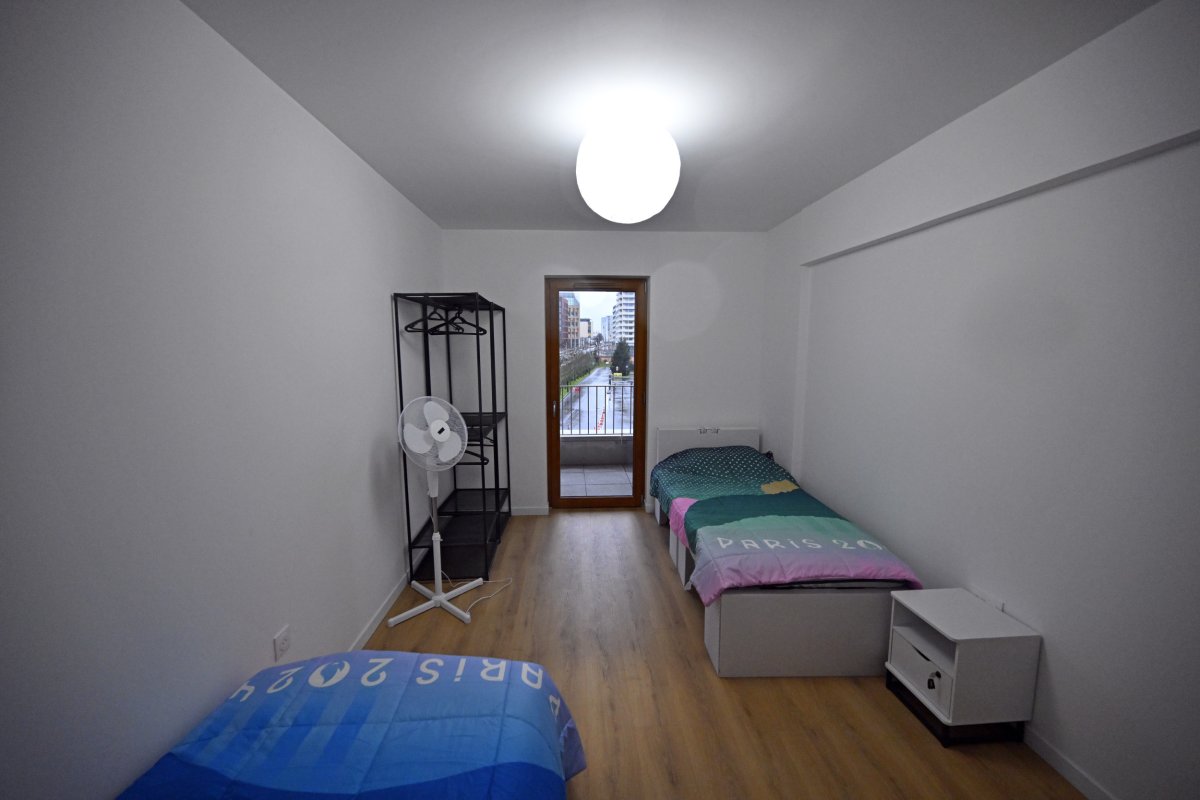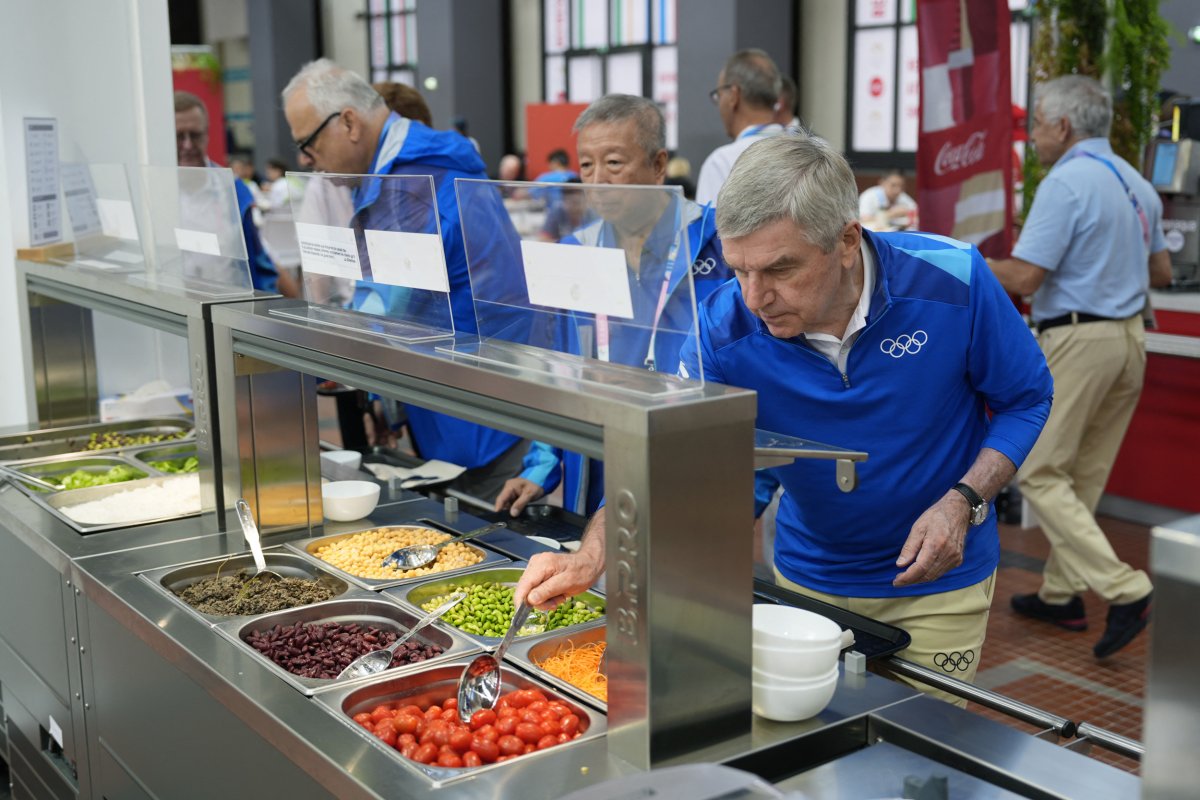What’s it like to stay in the Olympic Village while you compete for glory in Paris? Just let the athletes tell you themselves.
Intended to host the majority of the 11,000 athletes competing, the Village is chosen by most athletes to get the full Olympic experience. But according to the athletes’ own social media posts, the accommodations for these Games leave something to be desired — from the rock-hard cardboard beds to lack of privacy and mediocre food (in the gastronomic capital of the world, no less).
Among the most notable critics is the Team USA tennis superstar Coco Gauff, the world’s number two, who pointed out several issues with the living conditions. Gauff and her team opted to leave the Village and stay in hotels.

Coco Gauff shares a glimpse of their living conditions in the Olympic village.
Getty Images
In a candid TikTok video, Gauff gave a tour of the conditions inside the new $1.6 billion facility, revealing she had to share a bathroom with 10 other competitors before five of them decided to leave.
U.S. track-and-field athlete Chari Hawkins highlighted the lack of privacy for changing clothes, with her room having no curtains.
Also, since the athletes and delegations moved into the Village, at least five complaints for theft have been filed. On July 28, a rugby player from the Japanese team reported the theft of a wedding ring, a necklace and cash totaling an estimated 3,000 euros.
‘The bed sucks’
The Olympic Village’s infamous cardboard beds, first seen in Tokyo, have returned, facing criticism from athletes who have denounced their discomfort and fragility.
“The beds are very hard. Terrible. Very, very hard. We arrived so tired that in the end, you just lie down and fall asleep immediately,” said Spanish gymnast Ana Perez in an interview. She also mentioned spilling coffee on the bed and fearing it would “disintegrate.”
Team USA gymnastics superstar Simone Biles commented in another Instagram video that “the bed sucks” and that she was attempting to procure a mattress topper to fix it.
Swiss rower Celia Dupre shared her frustration, saying, “The cardboard box bed was so uncomfortable — hard as a rock. And then the Olympic duvet was really itchy, and it was really hot.”
While intended to be eco-friendly, the beds have been dubbed “anti-sex beds” due to their engineered fragility.
‘Extremely hot’
Organizers in Paris aimed to make this Olympics event the most sustainable ever, prioritizing a green approach in almost every area. That focus has resulted in uncomfortable conditions for competitors, with some also complaining about the heat in their rooms in the dead of the Parisian summer, where it was forecast to top 96 degrees Fahrenheit on Tuesday.
Like much of Europe, the Village complex does not have air conditioning. Instead, organizers implemented a water-cooling system under the Athletes Village, similar to the one that helps the Louvre Museum cope with heat. It hasn’t exactly worked.

A general view of a bed and mattress inside the Athletes’ Village ahead of the Paris Olympic Games on July 23, 2024 in Paris, France.
Getty Images
“There’s water in the walls that’s supposed to be a cooling system, but it really was hot, and we were on the second or third floor,” Dupre, the rower, said in a video. “I can’t imagine people on higher floors.”
Athletes from countries like Canada, Great Britain, Italy, Germany, Greece, Denmark, and Australia have been using portable A/C units in some or all of their rooms.
‘No world records’
The food at the Olympic Village has also been a subject of complaints. The menu is reportedly 60 percent vegan, posing a challenge for athletes who rely on meat-based diets to maintain their physical condition.
French publication L’Equipe reported that high-protein items such as eggs and grilled meats were rationed at breakfast on Saturday, leading to complaints about the meager portions.
Australian swimmer Ariarne Titmus, who has already won two medals at the games, complained that the “ridiculous” menu hindered her bid to set a world record in the 400m freestyle on Saturday.

German International Olympic Committee (IOC) President Thomas Bach tries food from a salad bar while touring at the Olympic Village, in Saint-Denis near Paris on July 22, 2024, ahead of the 2024 Paris 2024 Olympic Games.
Getty Images
‘It probably wasn’t the time I thought I was capable of, but living in the Olympic Village makes it hard to perform,’ Titmus said in an interview on Sunday. ‘It’s definitely not made for high performance, so it’s about who can really keep it together in the mind.’
Athletes receive no VIP treatment when traveling to and from events. They must use buses or the Paris Metro to reach stadiums and other venues. As a result, some delegations have considering moving athletes to hotels closer to the venues.
Six South Korean swimmers have left the Olympic Village and moved to a hotel near the swimming arena to avoid the long commute in hot buses, according to the Korea Swimming Federation (KSF) president.
Do you have a story Newsweek should be covering? Do you have any questions about this story? Contact LiveNews@newsweek.com
Uncommon Knowledge
Newsweek is committed to challenging conventional wisdom and finding connections in the search for common ground.
Newsweek is committed to challenging conventional wisdom and finding connections in the search for common ground.








